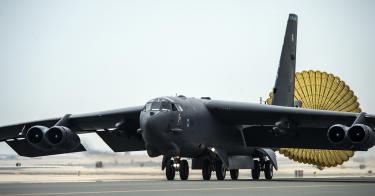Despite President Trump’s successful jaunt to the Middle East last month, advancing U.S. interests in that part of the world got tougher this week with the breakdown in relations between Qatar and several key regional states, including Saudi Arabia and Egypt.
Indeed, the last thing the United States needs in the Middle East is the fracturing of relations among its potential allies and partners in the face of violent Islamist extremism (such as ISIS and al-Qaeda), the ongoing bloodshed in Syria and Iran’s push for power.
Nor does Washington want to jeopardize its key military bases in Qatar — which is currently home to its biggest defense facilities in the region, following President Obama’s 2011 withdrawal from Iraq.
While Washington has military bases in other Persian Gulf states, including Kuwait and Bahrain, right now it has some 10,000 troops and a major airbase at al Udeid in Qatar.
Qatar is critical. The U.S. military not only conducts air operations out of al Udeid that support the fight in Syria, Iraq and Afghanistan, it also hosts the Tampa, Fla.-based U.S. Central Command’s forward headquarters.
No wonder Secretary of State Rex Tillerson called on the parties to work things out.
Indeed, the reported sending home and/or recalling of ambassadors, the cut-off of land, sea and air travel to Qatar and eviction of Qataris from the six countries that severed relations with it are serious, making this the biggest tiff among these states in years.
That said, it’s probably time for a clearing of the air.
An unvarnished discussion about Qatar’s role in the troubled region — which led Saudi Arabia, Egypt, the United Arab Emirates, Bahrain, Yemen and Maldives to cut ties with Doha — is probably due.
While some suggest that critical commentary on Qatar’s state-run media outlet, Al Jazeera, helped kick off the crisis, the anti-Qatar coalition’s current concerns about Doha’s international actions run wide and deep.
Perhaps most troubling is Iran. In the eyes of this Saudi/Egyptian-led group, Qatar is much too friendly with Iran — with which it shares a large Persian Gulf natural gas field.
Reports that Qatar’s emir, Sheikh Tamim bin Hamad al Thani, called Iranian President Hassan Rouhani after his re-election last month didn’t help ease worries.
Tehran, of course, is running hard against the Sunni and Arab grain with its support of the Shiite Houthi rebels in Yemen and its ally, the Bashar Assad regime in Syria, while fomenting instability among Shiites in Sunni-led Bahrain.
The ayatollah’s atomic aspirations only add to Arab anxiety.
The anti-Qatar crowd is also troubled by Qatari support for Islamist groups (such as the Muslim Brotherhood), which shook Egypt after the Arab Spring. The U.S. State Department reports that Qatari “entities/individuals” fund regional extremist groups (such as al-Qaeda affiliates).
Of course, a crisis provides not just risk but opportunity.
The risk is that the current Qatari crisis will undermine some of the issues and interests the United States cares about in the Middle East, including tackling terrorism and countering a resurgent Iran.
The opportunity is that a thorough diplomatic airing of the issues among these states will lead to a closer — though not an exact — alignment of their interests and a more unified effort to address their — and our — common challenges.
This piece originally appeared in the Boston Herald



